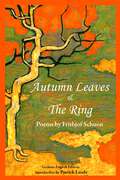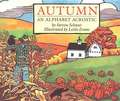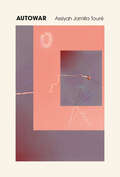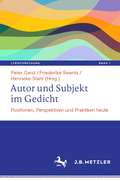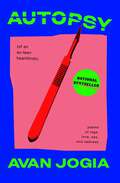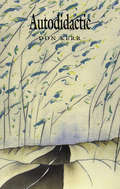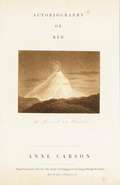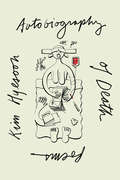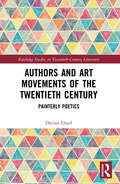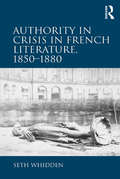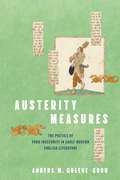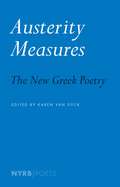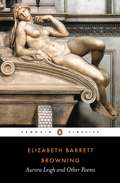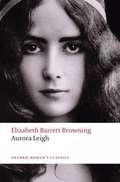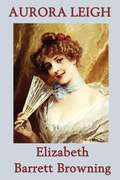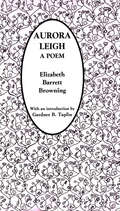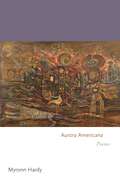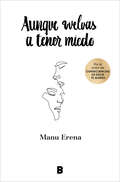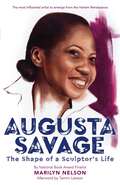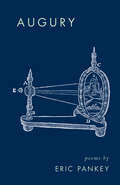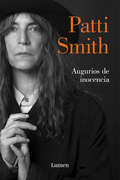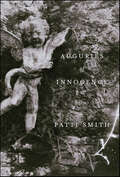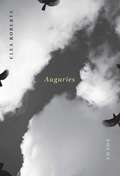- Table View
- List View
Autumn and Other Landscapes
by Pradip Acharya Hiren BhattacharyyaLife, works and poems of Hiren Bhattacharyya.
Autumn Leaves & The Ring: Poems By Frith
by Frithjof SchuonDuring the last three years of his life Frithjof Schuon wrote approximately 3,500 short poems in his mother tongue German. These poems, which have been called &“metaphysical music,&” cover every possible aspect of spiritual doctrine, practice and virtue, as well as the role and function of beauty. They express every conceivable subtlety of spiritual and moral counsel – and this is not merely in general terms, but with uncanny intimacy, detail and precision. They express the same unerring sharpness of intellect, profundity, comprehensiveness and compassion which one finds in the range of Schuon&’s better-known dialectical writings.This book contains two collections, Autumn Leaves and The Ring, and is offered here for the first time in a bilingual English-German edition. The various sections include: Beauty, Human Questions, Doctrine, Recollections, Images, and the Soul. In these poetic teachings Schuon speaks directly to the reader, expressing every conceivable subtlety of spiritual and moral counsel. They comfort and inspire the reader to cultivate inner beauty and seek a deeper consciousness of the presence of God.
Autumn
by Steven SchnurOne brief acrostic poem for each letter of the alphabet from acorn to zero follows the fall season from end of summer to chilly conclusion.
Autowar
by Assiyah Jamilla TouréA visceral, vital, unblinking debut collection of poems exploring kinesthetic memory and longing, inherited violence, and the body as a geographical site. We're often told that we are given only what we can bear. For some of us our first lessons are in how much pain we're made to think we deserve—and the resulting scars are always meant to be kept secret. Assiyah Jamilla Touré's debut collection is a record of those scars—not those inflicted on us by the thousands of little wars we live in everyday, but those that come afterwards, those we inflict upon ourselves to mark the path. Each and every poem in Autowar was written on a cell phone, transcribing an urgent revisiting of old sites of pain, and also a revisiting of one young person’s power and ability—to hurt themself, or others. These poems are powerful evocations of how even our scars have worlds and lives. here in the dark, me-spacei am insatiable for my fleshi just can't get enoughof tiny after-woundsthat's me giving, still too softfor my own teeth
Autor und Subjekt im Gedicht: Positionen, Perspektiven und Praktiken heute (Lyrikforschung. Neue Arbeiten zur Theorie und Geschichte der Lyrik #1)
by Friederike Reents Peter Geist Henrieke StahlDas seit jeher spannungsreiche Verhältnis zwischen Autor und Subjekt bildet in der Gegenwartslyrik ein Experimentierfeld, das eine Herausforderung für die Lyriktheorie darstellt. Die Beiträge diskutieren zentrale Positionen zu den Konzepten ‚abstrakter Autor‘ und ‚lyrisches Subjekt‘ unter Berücksichtigung ihrer unterschiedlichen Genese sowie Terminologie in den verschiedenen Philologien. Aus der Gedichtanalyse werden Perspektiven oder Alternativen zu diesen Konzepten entwickelt, um ein Instrumentarium zur Beschreibung der neuen Autor-Subjekt-Relationen in der Lyrik zu gewinnen. Der Band mit germanistischen, slavistischen, anglistischen und komparatistischen Beiträgen ist Ergebnis des DFG-Projekts zur „Typologie des Subjekts in der russischen Dichtung der 1990-2010er Jahre“ und der DFG-Kollegforschungsgruppe „Russischsprachige Lyrik in Transition – Poetische Formen des Umgangs mit Grenzen der Gattung, Sprache, Kultur und Gesellschaft zwischen Europa, Asien und Amerika“.
Autopsy (of an Ex-Teen Heartthrob): (poems of rage, love, sex, and sadness)
by Avan JogiaWriter, director, and actor Avan Jogia delivers a bright and acidic poetry collection on fame, rage, love, and sadness. A biting postmortem of the modern age, for fans of Lana Del Rey and Atticus.Avan Jogia grew up as a teen idol. He stumbled into the spotlight during the birth of the internet, the early days of Instagram and Twitter, before everyone online was a star. He spent his time in that spotlight writing, observing the cult of celebrity, the hilarity, the absurdity, and sometimes sinister side of being idolized before you&’ve even had the chance to decide for yourself who you are. Now, in his most revealing and honest work to date, he has assembled a book of poems as an act of self-dissection. Part boozy lovesick rage and part personal reflection on the nature of fame, Autopsy (of an Ex-Teen Heartthrob) is a sharp, tantalizing collection of poems examining Avan&’s relationship with ego, idolatry, love as an act of worship, rage as an act of prayer, and sadness as confession. Through vivid imagery (and sometimes startling honesty) Avan cuts himself open and observes the false gods he has worshipped, the ways he has sinned, and exhumes a version of himself that looks like someone we all know: a person searching for the means to cure pain, mend the wounds of insecurity, and satiate cravings for love.
Autodidactic
by Don KerrShortlisted for the 1998 Saskatchewan Book Award for Poetry Don Kerr's fifth poetry collection is a verbal joyride, an exuberant celebration of a book: a celebration of mountains and plains, of growing up and of being young, of being alive in the present moment and absorbing the feel of the road through the palms of your hands on the wheel. Autodidactic represents an erotics of the everyday, a tribute to place (and movement) and to family (and friends). This is not to say that Kerr sentimentalizes the ordinary, but rather that by examining it in the bright prairie sunlight, he is able to reveal its true extraordinariness. The deep-felt humour that is in many of the poems here does not arise from gilding events with comedy, but from the poet's seeing and drawing out of events what is truly and inherently comic within them. In this book Kerr is able to demonstrate the many shades of his voice and the many facets of his craft.
Autobiography of Red: A Novel in Verse
by Anne CarsonPoet Anne Carson reinvents a genre in Autobiography of Red, a stunning work that is both a novel and a poem, both an unconventional re-creation of an ancient Greek myth and a wholly original coming-of-age story set in the present.
Autobiography of Death
by Kim HyesoonKim Hyesoon’s poems “create a seething, imaginative under-and over-world where myth and politics, the everyday and the fabulous, bleed into each other” (Sean O’Brien, The Independent) The title section of Kim Hyesoon’s powerful new book, Autobiography of Death, consists of forty-nine poems, each poem representing a single day during which the spirit roams after death before it enters the cycle of reincarnation. The poems not only give voice to those who met unjust deaths during Korea’s violent contemporary history, but also unveil what Kim calls “the structure of death, that we remain living in.” Autobiography of Death, Kim’s most compelling work to date, at once reenacts trauma and narrates our historical death—how we have died and how we survive within this cyclical structure. In this sea of mirrors, the plural “you” speaks as a body of multitudes that has been beaten, bombed, and buried many times over by history. The volume concludes on the other side of the mirror with “Face of Rhythm,” a poem about individual pain, illness, and meditation.
Authors, Audiences, and Old English Verse
by Thomas A. BredehoftAuthors, Audiences, and Old English Verse re-examines the Anglo-Saxon poetic tradition from the eighth to the eleventh centuries and reconsiders the significance of formulaic parallels and the nature of poetic authorship in Old English.Offering a new vision of much of Old English literary history, Thomas A. Bredehoft traces a tradition of 'literate-formulaic' composition in the period and contends that many phrases conventionally considered oral formulas are in fact borrowings or quotations. His identification of previously unrecognized Old English poems and his innovative arguments about the dates, places of composition, influences, and even possible authors for a variety of tenth- and eleventh-century poems illustrate that the failure of scholars to recognize the late Old English verse tradition has seriously hampered our literary understanding of the period. Provocative and bold, Authors, Audiences and Old English Verse has the potential to transform modern understandings of the classical Old English poetic tradition.
Authors and Art Movements of the Twentieth Century: Painterly Poetics (Routledge Studies in Twentieth-Century Literature)
by Declan LloydThis book explores the great influence of twentieth-century artists and art movements on many major writers of the twentieth century. It focuses in particular on four seminal writers who were strongly influenced by very different movements: they are Gertrude Stein and Cubism, William S. Burroughs and Dada, J. G. Ballard and Surrealism, and Douglas Coupland and Pop Art. For these authors the presence and influence of these art movements is not limited to a small cluster of texts, but can be felt much more expansively across their work, infiltrating all manner of multifarious and complex dimensions. These authors are all keen to explore new methods of shifting the signature styles and forms of visual art into the literary world. Alongside these more overt methods of artistic transposition, the authors also often demonstrate a deep philosophical affinity with their chosen movements. This book uproots and examines these kinds of artistic engagements, and also explores the authors’ own personal connections with the world of art. For these are all authors not only interested in visual art, but also intimately connected to the art world. Indeed, some went on to become renowned artists in their own right, while others were closely associated with major historical art figures. Above all however, they are unified by a kindred interest in exploring how the methods and philosophies of art can be transposed into, and even challenge the constraints of traditional forms of literature.
Authority in Crisis in French Literature, 1850–1880
by Seth WhiddenBy the 1850s, the expansion of printing and distribution technologies provided writers with more readers and literary outlets than ever before, while the ever-changing political contexts occasioned by the revolutions of 1830 and 1848 brought about differing degrees of political, social, and literary censure and pressure. Seth Whidden examines crises of literary authority in nineteenth-century French literature, both in response to the attempts of the Second Empire (1852-1870) to restore the unquestioned imperial authority that had been established by Napoleon I and in the aftermath of the bloody Paris Commune of 1871. In each of his chapters, Whidden offers a representative case study highlighting one of several phenomena-literary collaboration, parody, destabilized poetic form, the substitution of one poetic or narrative voice with that of the man-that enabled challenges to the traditional status of the writer and, by extension, the political authority that it reflected. Whidden focuses on the play Le Supplice d’une femme (1865); the Cercle Zutiste, a group of writers, musicians, and artists who met regularly in the fall of 1871, only months after the fall of the Second Empire; Arthur Rimbaud’s Commune-era poems; and Jules Verne’s 1851 ’Un voyage en ballon,’ later reprinted as ’Un drame dans les airs’ in 1874. Whidden concludes with a futuristic look at authority and auctority as it pertains to midcentury writers taking stock of the weakened authority still possible in a post-Second Empire France and envisioning what kind of auctority is still to come.
Austerity Measures: The Poetics of Food Insecurity in Early Modern English Literature
by Anders M. Greene-CrowExplores how early modern writers used poetry to fight food insecurityAusterity Measures explores how early modern writers used poetic form as a tool to fight extreme food insecurity. Authors such as Thomas Tusser, George Herbert, Robert Herrick, Anne Bradstreet, and Thomas Tryon witnessed the privatization of public farmland, rising food prices amidst uncontrolled inflation, mass starvation in nascent North American colonies, and the racist violence of the Caribbean plantation slavery system. Anders M. Greene-Crow shows how these authors experimented with literary form in an effort to change readers’ beliefs and behaviors with regard to food ethics.By examining this history, Greene-Crow sheds new light on both modern-day food ethics and activism’s place in literary writing. This book traces how authors’ solutions to food insecurity turned away from structural models of communal care and toward the now-dominant consumer-capitalist model championing individual dietary choice. Simultaneously, he reveals why literary criticism began to discount literature’s power as a tool for social change. The New Critical school, whose close reading methodology dominates literary analysis, arose out of Southern Agrarianism, a movement that sought to return the South to antebellum structures of racial hierarchy and labor exploitation that took shape in the early modern period. These intersectional labor politics underlie close reading, continuing to limit critics’ understanding of how literary form produces social change, and reinforcing the scarcity culture of literature departments today.By recovering poetry’s role as a force for affecting readers’ relationship to one of their most basic needs—the need to eat—Austerity Measures develops an alternative methodology that takes writers’ material conditions into account in analyzing form.
Austerity Measures: The New Greek Poetry
by Karen Van DyckA remarkable collection of poetic voices from contemporary Greece, Austerity Measures is a one-of-a-kind window into the creative energy that has arisen from the country's decade of crisis and a glimpse into what it is like to be Greek today.The 2008 debt crisis shook Greece to the core and went on to shake the world. More recently, Greece has become one of the main channels into Europe for refugees from poverty and war. Greece stands at the center of today’s most intractable conflicts, and this situation has led to a truly extraordinary efflorescence of innovative and powerfully moving Greek poetry. Karen Van Dyck’s wide-ranging bilingual anthology—which covers the whole contemporary Greek poetry scene, from literary poets to poets of the spoken word to poets online, and more—offers an unequaled sampling of some of the richest and most exciting poetry of our time.
Aurora Leigh and Other Poems
by Elizabeth BrowningAurora Leigh (1856), Elizabeth Barrett Browning's epic novel in blank verse, tells the story of the making of a woman poet, exploring 'the woman question', art and its relation to politics and social oppression. The texts in this selection are based in the main on the earliest printed versions of the poems. What Edgar Allan Poe called 'her wild and magnificent genius' is abundantly in evidence. In addition to Aurora Leigh, this volume contains poetry from the several volumes of Elizabeth Barrett Browning's published poetry from 1826 to 1862, including Casa Guidi Windows (1851), Songs for the Ragged Schools of London (1854) and the British Library manuscript text of the 'Sonnets from the Portuguese' (1846) which records her courtship with Robert Browning.
Aurora Leigh
by Elizabeth Barrett Browning Kerry McsweeneyWidely regarded as Elizabeth Barrett Browning's (1806-1861) major work, Aurora Leigh is important both for its address to contemporary social issues, the "woman question" in particular, and for its experimentation with poetic form. The text of this edition is based upon meticulous examination of the extant manuscripts, corrected proofs, and revisions to the poem. It is accompanied by a full textual history of the poem's composition and publication; comprehensive annotation of literary allusions and contemporary references; and an essay on the significance of the verse-novel as an early example of politically self-conscious women's writing.
Aurora Leigh
by Elizabeth Barrett BrowningAurora Leigh is an aspiring poet of independent spirit, rebelling against the stifling constraints of Victorian middle-class society and struggling for self expression. This story exposes the hypocrisy and repressive social attitudes of Victorian England.
Aurora Leigh
by Elizabeth BrowningA novel in blank verse by Elizabeth Barrett Browning, published in 1857. The first-person narrative, which comprises some 11,000 lines, tells of the heroine's childhood and youth in Italy and England, her self-education in her father's hidden library, and her successful pursuit of a literary career. Initially resisting a marriage proposal by the philanthropist Romney Leigh, Aurora later surrenders her independence and weds her faithful suitor, whose own idealism has also since been tempered by experience. Aurora's career, Romney's social theories, and a melodramatic subplot concerning forced prostitution elicit the author's vivid observations on the importance of poetry, the individual's responsibility to society, and the victimization of women.
Aurora Americana: Poems (Princeton Series Of Contemporary Poets Ser. #174)
by Myronn HardyFrom an award-winning poet, an exciting new collection that explores exile and return, from North Africa to North AmericaIn Aurora Americana, Myronn Hardy, an American poet who moved back to the United States after living for years in Morocco, reflects on exile and return as he describes the experience of leaving North Africa and rediscovering a North America both recognizable and unrecognizable. What does it mean to feel exiled both away from and at “home”? What does it mean to miss something?In forms such as the sonnet, ghazal, and triolet, Aurora Americana takes up the distant and recent past of the United States, from Thomas Jefferson to the deadly “Unite the Right” march in Charlottesville, Virginia. But the book also meditates on smaller, momentary encounters across racial and national barriers, from evocations of Francophone Africa to a screening of Black Panther in Portugal for a mostly white audience. Allusions to Fannie Lou Hamer, Frantz Fanon, Prince, John Coltrane, Alessandro de’ Medici, Ahmed Zaki, Modesto Brocos y Gómez, Nasser Zefzafi, and others anchor the collection. With poems set at or near dawn, Aurora Americana explores an ominous yet hopeful new morning in America, one in which potential cataclysm exists alongside possibility and change.
Aunque vuelvas a tener miedo
by Manu ErenaEl nuevo libro del fenómeno de la poesía en España: Manu Erena, el autor de Consecuencias de decir te quiero y Nos quedarán más atardeceres. Este libro está dedicado a aquellas personas que temen, aman y luchan día a día. A aquellos que siguen adelante a pesar del dolor. «Después de perderlo todoy de obligarnos a curarnuestras heridas más profundas,sanaremos cuando seamos capacesde hablar sobre todo lo que nos duele.Yo fui mi propio miedo hasta que me di cuentade que no quería un final así para mi historia,hasta que pude cambiarlo contigo.Porque, aunque vuelvas a tener miedo,el amor también es capaz de salvarnos,y decir adiós es otra forma de querer.» Tras el éxito arrollador de Consecuencias de decir te quiero y Nos quedarán más atardeceres y haber sido el autor de poesía más vendido antes de cumplir los dieciséis años, Manu Erena se consolida como la voz poética de toda una generación. Con la belleza y la sensibilidad que ha conquistado a sus miles de lectores, en este libro nos habla de todo lo que solemos callar, de los temores -esos que llegan en la adolescencia y no nos abandonan nunca- y de lo importante que es contar en la vida con personas que nos ayudan a plantar cara al miedo y son refugio para seguir adelante. La crítica ha dicho:«Sincera, sutil y desgarradora. La poesía de Manu Erena te hará sentir desde la primera página».Inma Rubiales «La pureza de las palabras de Manu Erena enamorarán tus recuerdos».Defreds «Manu Erena es la sorpresa editorial del año.»Zenda «Manu Erena, el poeta de 16 años que pulveriza las listas de ventas.»The Objective «Los versos de Manu Erena se han ganado el corazón de los lectores.»Woman
Augusta Savage: The Shape of a Sculptor's Life
by Marilyn NelsonA Claudia Lewis Award Winner for Poetry by the Bank Street College of Education A Black Caucus ALA Children & Young Adult Award Winner A CCBC Children&’s Choice • A CBC Teacher Favorite This powerful biography in poems tells the life of Augusta Savage, the trailblazing artist and pillar of the Harlem Renaissance. Augusta Savage was arguably the most influential American artist of the 1930s. A gifted sculptor, Savage was commissioned to create a portrait bust of W.E.B. Du Bois for the New York Public Library. She flourished during the Harlem Renaissance, and became a teacher to an entire generation of African American artists, including Jacob Lawrence, and would go on to be nationally recognized as one of the featured artists at the 1939 World&’s Fair. She was the first-ever recorded Black gallerist. After being denied an artists&’ fellowship abroad on the basis of race, Augusta Savage worked to advance equal rights in the arts. And yet popular history has forgotten her name. Deftly written and brimming with photographs of Savage&’s stunning sculpture, this is an important portrait of an exceptional artist who, despite the limitations she faced, was compelled to forge a life through art and creativity. Features an afterword by the curator of the Art & Artifacts Division of the Schomburg Center for Research in Black Culture. NAMED ONE OF THE BEST BOOKS OF THE YEAR BY Horn Book • Kirkus Reviews • School Library Journal • Bank Street College ★ "A stunning portrait of artistic genius and Black history in America." —Booklist, starred review ★ "A wonderful addition to young people&’s literature on African American artists." —Horn Book, starred review ★ "In a rich biography in verse, Nelson (A is for Oboe) gives voice to the Black sculptor Augusta Savage (1892-1962), a key Harlem Renaissance figure." —Publishers Weekly, starred review ★ "Nelson&’s arresting poetry, which is accompanied by photographs of Savage&’s work, dazzles as it experiments with form. … A lyrical biography from a master of the craft." —Kirkus Reviews, starred review ★ "A master poet breathes life and color into this portrait of a historically significant sculptor and her remarkable story." —School Library Journal, starred review
Augury: Poems
by Eric PankeyFrom award-winning poet and author of Crow-Work, a collection exploring the presence of the divine in the seemingly ordinary. The ancient Romans practiced augury, reading omens in bird&’s flight patterns. In the poems of Augury, revelation is found in nature&’s smallest details: a lizard&’s quick movements, a tree scarred by lighting, the white curve of a snail&’s shell. Here the sensory world and the imagined one collide in unexpected and wonderful ways, as Pankey scrutinizes the physical for meaning, and that meaning for truth. With uncommon grace, each of Pankey&’s precise lyrics advances our shared ontological questions and expresses our deepest contradictions. In a world of mystery, should we focus on finding meaning or creating it? How can the known—and the unknown— be captured in language?Augury is a masterful and magical collection from a poet of stirring intelligence, &“a book of stones unstitched from the wolf&’s belly.&”Praise for Augury &“A darkly luminous book by a poet at the height of his considerable poetic power.&” —Kathy Fagan, author of Moving & St. Rage &“This is a book I will keep close at hand, alongside the best work of Montale, Dickinson, Celan, and Stevens. This is a book one will turn to again and again.&” —Rebecca Dunham, author of Cold Pastoral &“Each ethereal image he weaves into his work is delicately curated, whittled down through his attention to sound. . . . Pankey&’s poems destabilize as they straddle time and place, and he looks askance at the narrow way in which language is often viewed.&” —Publishers Weekly
Augurios de inocencia
by Patti SmithLa esencia de Patti Smith, su ADN. «Una joya escondida. Entre las mejores de ellas.»Library Journal «Rompimos el corazón de nuestra madre y nos convertimos en lo que somos.» La artista que ha inscrito su visión de nuestro mundo en poderosos himnos, baladas y letras desvela en esta deliciosa colección de poemas su universo más íntimo: el vínculo con la naturaleza y el paisaje, su mapa interior, las contradicciones del individuo, su meditación sobre la muerte y con la fe. Un monólogo interior fresco y original impregnado de influencias eclécticas como las de Rimbaud, Picasso, Arbus, o William Blake, cuya poesía la acompañó desde que, a la edad de ocho años, su madre le regaló un ejemplar de Canciones de inocencia y de experiencia. La gran creadora que confesó «Si tuviera que quedarme con una sola cosa sería la literatura» deslumbra con su poesía. La crítica ha dicho...«Un libro duro, magnético y bello. Un poemario revelación, como una visión o un manifiesto de esperanza, que lucha contra el horror, contempla la barbarie para luego acusar a sus culpables y exonera a los niños, los de ahora y los que llevamos dentro, que quizá hemos traicionado.»Ester Andorrà, El Nacional «En su primer poemario en varios años, Augurios de inocencia, presenta obras ligeras e inquietantes por su indagación espiritual, la imaginería original y las asociaciones insólitas. [...] Romántica y renegada, Smith pasa de la ira a la empatía y nos recuerda que puede haber sanación en la protesta, consuelo en el lenguaje, catarsis en la expresión. Como siempre, nos lleva a las profundidades más dolorosas y luego nos acerca bailando hacia la luz.»Donna Seaman, Booklist «Treinta años después de Horses la luz de Smith sigue brillando con fuerza.»San Francisco Chronicle «Una joya escondida. Entrelas mejores de ellas.»Library Journal
Auguries of Innocence: Poems
by Patti SmithAuguries of Innocence is the first book of poetry from Patti Smith in more than a decade. It marks a major accomplishment from a poet and performer who has inscribed her vision of our world in powerful anthems, ballads, and lyrics. In this intimate and searing collection of poems, Smith joins in that great tradition of troubadours, journeymen, wordsmiths, and artists who respond to the world around them in fresh and original language. Her influences are eclectic and striking: Blake, Rimbaud, Picasso, Arbus, and Johnny Appleseed. Smith is an American original; her poems are oracles for our times.
Auguries
by Clea RobertsWhether speaking of erotic love, domestic life, spiritual wilderness, or family entanglements, the poems of Auguries, the much-anticipated second collection from Yukon poet Clea Roberts, are saturated with their northern landscape. Roberts is well versed in the distances and dynamics between tedium and ecstasy, light and dark, isolation and solitude, freeze and thaw, flow and stillness. Her poems are spare and clean, each like a single larch in an immense white plain; their exactness startling and arresting. As the Gerald Lampert Award jury citation for her celebrated first book noted, “Her images . . . are not only crisp and precise, but manage to speak about the physical conditions of this place and its emotional landscape in one and the same lyrical breath . . .” Written during a period in which Roberts both became a parent and lost a parent, the poems in Auguries lend themselves to prayer, surrender, celebration, reconciliation, meditation, and auspice. Tell me how to breathe between the painful and the beautiful, my lips, my eyelids slow with cold. (from “Cold Snap”) “Clea Roberts writes poems of clear, quiet beauty. They contain the silence of perception: alive to the world with open eye and open heart.” — Anne Michaels

